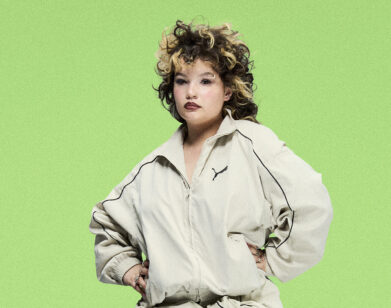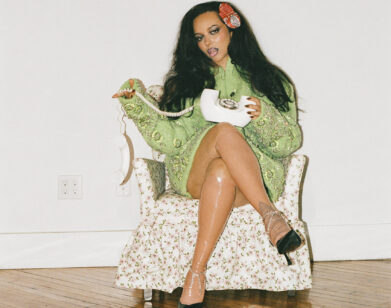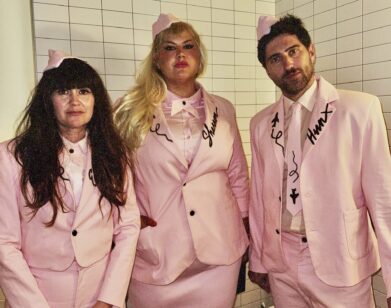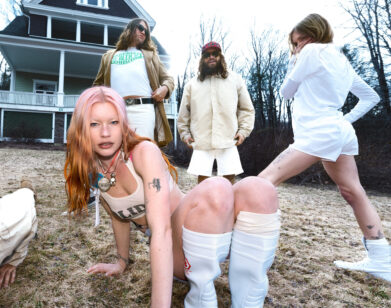Exclusive Song Premiere and Interview: ‘Night Fever,’ Visitors
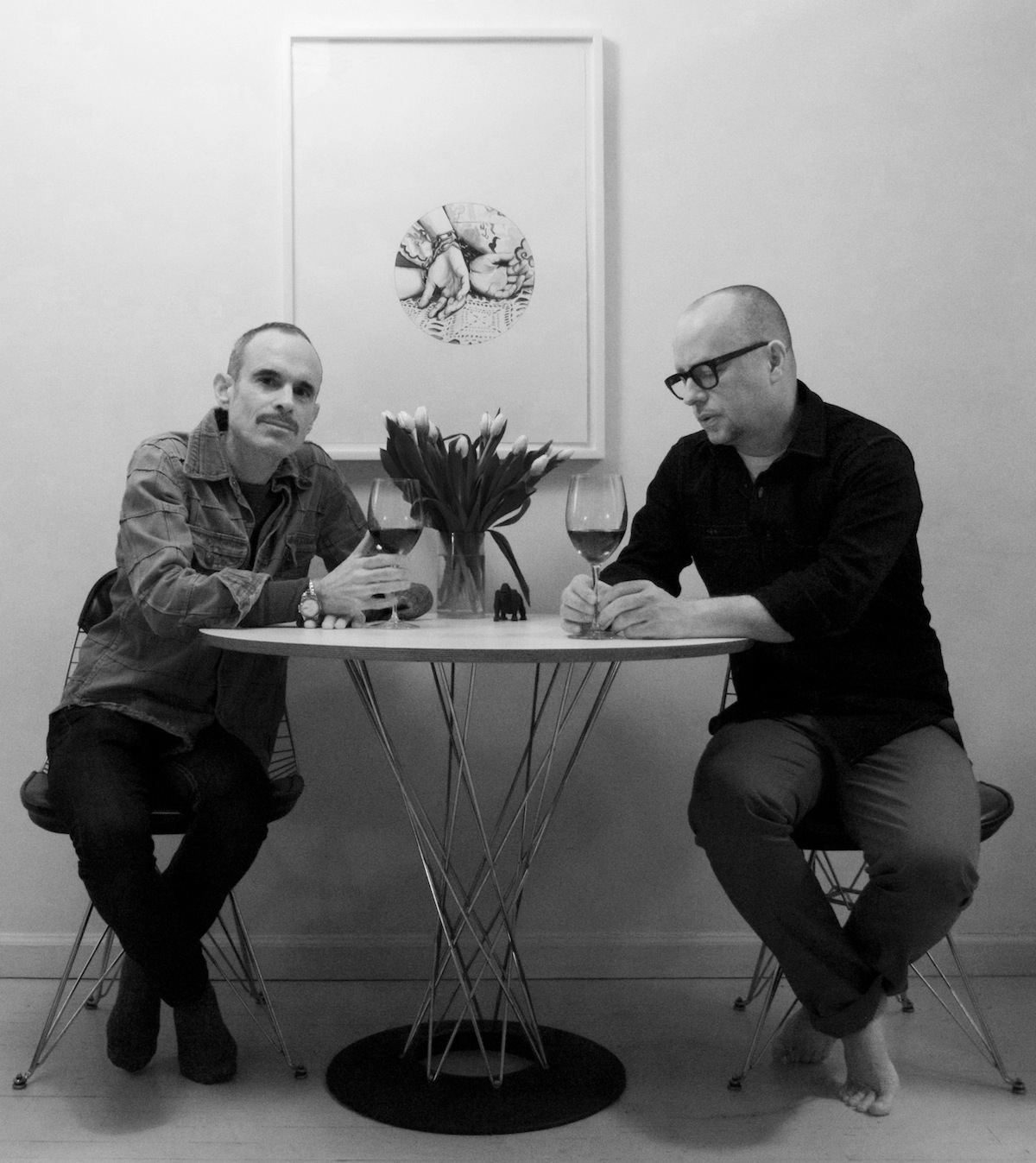
ABOVE: DENNIS “CITIZEN” KANE (LEFT) AND SAL PRINCIPATO OF VISITORS. IMAGE COURTESY OF DAN HILL
Over the past few decades, Sal Principato and Dennis “Citizen” Kane have played pivotal roles in defining the New York City dance scene. Sal, as frontman of post-punk icons Liquid Liquid, has inspired countless new disco acts, and his band was asked to open for LCD Soundystem’s weeklong string of farewell shows. “I don’t think we’ve ever been a group for the masses,” he still maintains, but it’s hard to argue with a packed house at Madison Square Garden. Kane, too, has been integral to the NYC club circuit since the ’90s, DJing countless parties including Strobe Lodge, the long-running warehouse party with Metro Area’s Darshan Jesrani.
Together, the two friends are Visitors. With Kane at the helm, the duo has teamed up again, and delved deep into the heady, rhythmic dance music for which they’re best known. “Night Fever” is anchored by bassist Mark Dann and a star turn from Jogyo vocalist Devi Mambouka, who sings Kane’s melody in sultry French. The result is “sexy, atmospheric, and moody,” says Principato.
You can listen to the exclusive premiere of the original version here. (The 12″ will also include dub-y remixes from The Idjut Boys). Read on for our interview, where we talk vegan cooking, the evolution of the New York dance scene, and the making of the perfect dance track.

NATHAN REESE: Tell me about “Night Fever.” What was it like working with together again?
DENNIS “CITIZEN” KANE: Well, for this song, it’s pretty much just me. Sal played percussion, but I wrote and produced the track. You know, it was an idea like most ideas—you just sit down at the keyboard and start building.
SAL PRINCIPATO: I just love to work with [Dennis]. He’s meticulous, he’s focused. He’s trying to break through barriers in his music. We did the first Visitors record [“Ledger”] where I did the vocals, and for this one I did percussion. When he calls me in, I’m there. I’m ready for what he needs me for.
REESE: I know it had been a couple years since the last release. Why bring back the Visitors moniker?
KANE: I like the name Visitors, and that’s what I’m going to keep putting stuff out as. I like working with Sal. I like working with people I have daily relationships with. You keep the dialogue going on a bunch of levels. It’s a pleasant thing to work with people that you enjoy and respect. The first Visitors [track] was written when I was recovering from a really bad accident, and it just came to me when I was writing it that Sal needed to sing it. I was hearing the lyrics in Sal’s voice. For this one, he’s a great percussionist and he did a really nice job.
PRINCIPATO: I think we’re very much on similar tracks musically. What he’s doing with Visitors is right up my alley—I totally relate to it. Even when I did the first Visitors record, it was the first time I had let someone write the words for me, and Dennis did it with my approach and my music in mind. I was intrigued that someone took the time, and had the motivation to do that. Visitors isn’t a big departure from what I would have come up with myself.
REESE: How did you decide to bring in Devi Mambouka on board for vocals?
KANE: I had written the lyrics, and I wanted to find someone to sing it. I had heard Devi sing with her band, and I liked the quality of her voice. She has this Lizzy Mercier/Grace Jones kind of intensity to her. Then, right at the first session I suggested she sing in French, and she liked the idea.
REESE: How did you guys meet for the first time?
PRINCIPATO: My first recollection of meeting him, was that it was a five or six years ago and he came to see me at a DJ gig. He was very excited and supportive, and we became fast friends. He’s trying take what is a given, and what is generally accepted, and taking it to a place that isn’t so obvious. There are no little Post-Its that say “It’s time to party” or “It’s time to dance.”
KANE: Well, I knew Liquid Liquid for a long time. They were such an important group, and I liked 99 Records as a label. Their records are great—the Glenn Branca record is terrific. I think he was DJing somewhere and we were introduced to each other. We just had a lot in common and started being friends really quickly. We’re both into cooking a lot, so a lot of our conversations revolve around food.
REESE: What sort of things do you like to cook?
KANE: Well my repertoire is different from Sal’s, but one of the challenges for me is that Sal is vegan. So when I cook for him, it has to be vegan. The other thing is, when I go over there and he cooks, I never think of the food as “vegan food.” It’s just good food. You’re just like, “Wow, this is delicious!” After my accident, I had a pretty long convalescence, and Sal would just come over and we’d eat these really hot dosas and drink beer.
PRINCIPATO: I love the challenge of making grains and vegetables and legumes and fruits as satisfying as something that includes animal fats. I find that when you cook your own food for yourself and the people you care about, it’s so much more fulfilling than eating commercial food. I find it very empowering to cook for myself. It centers me.
REESE: Both of you have been in the New York dance community for so long. How have you seen it evolve over the years?
KANE: Well there isn’t much of a scene right now. The Bloomberg administration has made it very difficult for people to throw big parties. I guess there’s an influx of people that tend to be more white and they tend to be more moneyed, so musically it’s not as interesting. It’s not as soulful. It’s not as much fun. When I think of a good New York party, I think of a mixture of black and white and rich and poor. Now, it’s a bunch of people with beards and flannel shirts. And that’s not a pejorative on those people—there’s some great people out there doing really great parties. I just miss that flavor. Darshan [Jesrani] and I actually did a party the last night of the [Hurricane Sandy] blackout in Williamsburg, and it was a terrific time and a great crowd.
PRINCIPATO: It constantly evolves. There’s not so much of a club culture these days. It’s more bar and hotel culture. It’s smaller, more casual. There are still big parties, but it’s become more diffuse. That being said, I think people are very aware of music, and very knowledgeable. They’re very critical, but they’re critical in terms of what you’re supposed to be doing: “It’s okay to let loose. It’s okay to party.” Back in the day, or along the way too, you could be a little bit more idiosyncratic.
REESE: Speaking of back in the day, both Visitors and your solo stuff have a pretty analog sound.
PRINCIPATO: I don’t think there was any grand plan to be more analog than electronic, but I think that the analog and the electronic stuff have the same references. There’s a certain rootsiness that I personally try to achieve. Of course, you can do that with electronic music, too—but when you have an analog approach I think it speaks more for yourself… It all depends on your approach. There’s plenty of generic analog music out there too.
KANE: I think you can make music any way and it can be fine, and you can make music any way and it can be awful. I don’t have any kind of formal notions, but I like using live musicians. It adds so much to the song, where things aren’t just snapped onto a grid. When you get a couple of great musicians, you feel comfortable working, and it’s really good.
REESE: What, in your opinion, makes a really great dance track?
KANE: It’s like something Billy Wilder would say: “I know it’s a good film when I see it.” A song has to feel a sense of urgency, I think. It has to have a sense of specificity. There’s a ton of generic stuff that comes out—any time a process becomes democratized, you’re going to get that. A million people put out a million tracks each week, and for the most part, they fit into this generic new-disco envelope. Having tonal complexity, having great performances—and that could just be on your computer as well. And a great vocal. When you have that, it’s an amazing thing.
FOR MORE ON THE BAND, VISIT THEIR LABEL, DISQUES SINTHOMME.

